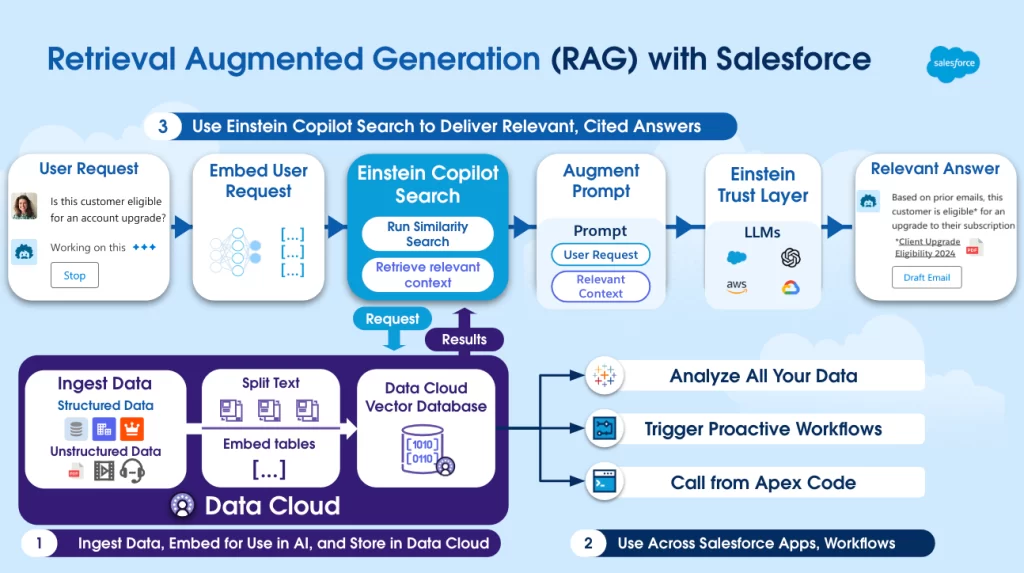- The Data Cloud Vector Database integrates diverse business data, merging unstructured formats with CRM data.
- This integration facilitates the foundation of AI prompts and the functionality of Einstein Copilot, removing the necessity for intricate and expensive fine-tuning of LLM models.
- Einstein Copilot Search introduces AI-driven search capabilities, swiftly delivering precise responses from the Data Cloud within a conversational AI interface.
Salesforce unveiled significant enhancements to its Einstein 1 Platform, introducing the Data Cloud Vector Database and Einstein Copilot Search. The Data Cloud Vector Database addresses the need for accurate and relevant generative AI prompts rooted in comprehensive enterprise data. Previously, achieving this required extensive model fine-tuning, which was costly and labor-intensive. This database aims to simplify the process by facilitating the integration of unified business data into AI prompts. It enables customers to seamlessly deploy trusted and relevant generative AI across all Salesforce applications without requiring extensive fine-tuning of off-the-shelf large language models (LLMs).

Integrated within the Einstein 1 Platform, the Data Cloud Vector Database empowers AI, automation, and analytics, facilitating better decision-making and deeper customer insights across various Salesforce CRM applications. Additionally, Data Cloud will fuel Einstein Copilot Search, an enhancement to Salesforce’s generative AI assistant, Einstein Copilot. This AI search feature leverages business data to deliver more precise information within the workflow, further enhancing user convenience and productivity.
“The Data Cloud Vector Database relieves the challenge of costly and complex processes to harness the value of unstructured data. Now, our customers can reason over their full spectrum of their enterprise data to power their business applications more effectively. By integrating both structured and unstructured data, our new Data Cloud Vector Database transforms all business data, from emails to documents to transcripts to social media posts, into valuable insights. This advancement in Data Cloud, coupled with the power of LLMs, is a game-changer, fostering a data-driven ecosystem where AI, CRM, automation, Einstein Copilot, and analytics turn data into actionable intelligence and drive innovation.” — Rahul Auradkar, EVP and GM of Unified Data Services & Einstein
Introducing Salesforce’s Latest Innovations: Revolutionizing Data Accessibility and AI Search Capabilities
Data Cloud Vector Database
The Data Cloud Vector Database heralds a transformative era by eliminating the need for fine-tuning Large Language Models (LLMs). This innovation seamlessly integrates diverse business data, from unstructured sources like PDFs, emails, and documents to structured information such as purchase histories and customer support cases. By empowering AI, automation, and analytics across every Salesforce application, this unification maximizes business value and Return on Investment (ROI). For instance, customer service leaders can significantly enhance efficiency and satisfaction by proactively presenting pertinent knowledge articles to service agents right when a case is initiated. This allows for swift identification of similar cases and the integration of automation, reducing resolution time and elevating the overall customer experience.
Einstein Copilot Search
Set to launch in February; Einstein Copilot Search augments the existing capabilities of Einstein Copilot with advanced AI-driven search functionalities. This upgrade enables diverse business teams—sales, customer service, marketing, commerce, and IT—to leverage an AI assistant that adeptly addresses complex queries using real-time unstructured and structured data. By tapping into insights previously beyond reach due to limitations in foundational LLMs’ training data, Einstein Copilot Search provides citations to the source material, bolstering confidence in AI-generated content. For instance, in customer service scenarios, it can seamlessly link customer concerns from unstructured communications to their structured support ticket history, empowering service representatives with comprehensive insights and AI-generated resolution suggestions backed by data. This integration of source citations reinforces the reliability of AI-generated insights, boosting the team’s trust in the information provided.
Significance: Bridging the Unstructured Data Divide
The essence of delivering impactful customer experiences and AI innovation lies in data accessibility. However, 90% of enterprise data is in unstructured formats such as PDFs, emails, social media content, and audio files. This unstructured data presents a significant obstacle for business applications and AI models, rendering it largely inaccessible. Projections from Forrester paint a striking picture, foreseeing a doubling of the volume of unstructured data managed by enterprises by 2024, underscoring the pressing nature of this challenge.
Despite an overwhelming 80% acknowledgment among IT leaders regarding the transformative potential of generative AI in maximizing data efficacy, there’s a critical gap: 59% of these leaders still lack a cohesive, unified data strategy to harness this tremendous powerfully. This gap signifies the immediate need for enterprises to craft and implement unified data strategies, essential in unlocking the potential held within unstructured data for driving innovation and delivering superior customer.

Use Cases
1. Customer Service Through Einstein Copilot-Powered Chatbot:
Customers accessing the self-service page can inquire about upgrade eligibility with the Einstein Copilot-driven chatbot. Utilizing information sourced from various knowledge repositories, the chatbot delivers accurate responses by citing specific articles.
2. Enhanced Service Efficiency:
Service leaders can optimize productivity and enhance customer experiences by leveraging insights into service-related trends. By employing unstructured data and AI, call center leaders can automatically compare cases, identifying duplicates through automated Flows. Additionally, analytics tools like Tableau enable clustering knowledge articles, unveiling trends within newly generated cases and articles, ultimately fostering improved customer experiences.
3. Personalized Marketing Campaigns Driven by Consumer Behavior:
Marketers possess the capability to tailor campaigns based on consumer intent and behavior. Marketers can use Marketing Cloud Intelligence to analyze unstructured survey data and transcripts within the Data Cloud to comprehend consumer intent. This understanding aids in refining email templates directly within Einstein Copilot, facilitated by natural language instructions.
4. Product Description Generation for Commerce Teams:
Commerce teams can expedite the creation of new product descriptions by utilizing Einstein Copilot. Brand managers can swiftly request comparisons between new and existing products, extracting pertinent details from related product catalogs to generate relevant descriptions.
5. AI-Powered Sales Insights for Revenue Growth:
Sales representatives leverage AI to extract insights from previous customer interactions, preparing comprehensively for upcoming meetings. Through Einstein Copilot, sales reps reference specific unstructured data, such as customer 10-K reports or past email exchanges, to gather critical information. This includes insights into the customer company’s top initiatives for the next fiscal year and details about the new executive team, enabling sales reps to approach meetings armed with valuable insights.
6. IT-driven Anomaly Detection in Product Telemetry:
IT departments utilize Data Cloud to ingest unstructured content from machine operations, encompassing machine logs, sensor data, images, and audio recordings. Tableau’s analytical capabilities and Einstein’s semantic similarity analysis enable the identification and flagging abnormal data points. These anomalies indicate equipment issues, facilitating timely problem discovery and resolution.
FAQs
1. What is the Data Cloud Vector Database, and how does it impact Salesforce applications?
The Data Cloud Vector Database integrates diverse business data, merging unstructured formats with CRM data and empowering AI, automation, and analytics across Salesforce applications. It eliminates the need for intricate fine-tuning of Large Language Models (LLMs), providing accurate generative AI prompts.
2. What is Einstein Copilot Search, and how does it enhance AI capabilities within Salesforce?
Einstein Copilot Search augments Einstein Copilot with advanced AI-driven search functionalities. It enables diverse business teams to access structured and unstructured data in real-time, providing citations to the source material and empowering AI-generated content with comprehensive insights.
3. What role does the Data Cloud Vector Database play in unlocking the potential of unstructured data for enterprises?
The Database enables AI-driven applications to reason over unstructured data, turning it into actionable intelligence. It aids in automating processes, reducing resolution time, and ultimately enhancing customer experiences.
[To share your insights with us, please write to sghosh@martechseries.com]


